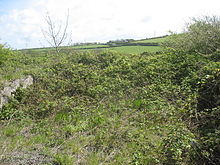St Enghenedl's Church, Llanynghenedl
| St Enghenedl's Church, Llanynghenedl | |
|---|---|

The interior of the former church
|
|
|
Location in Anglesey
|
|
| Coordinates: 53°17′56″N 4°31′37″W / 53.299027°N 4.526968°W | |
| OS grid reference | SH316809 |
| Location | Llanynghenedl, Anglesey |
| Country | Wales, United Kingdom |
| Previous denomination | Church in Wales |
| History | |
| Founded | c.620 |
| Dedication | Enghenedl |
| Architecture | |
| Status | Church |
| Functional status | Demolished |
| Architect(s) | Henry Kennedy (1862) |
| Completed | 1862, replacing a 13th/14th-century church |
| Demolished | 1988 |
| Specifications | |
| Length | 43 ft 6 in (13.3 m) |
| Width | 15 ft 6 in (4.7 m) |
St Enghenedl's Church, Llanynghenedl, is a former parish church in Anglesey, north Wales, dedicated to the son of a 6th-century King of Powys. According to the 19th-century antiquarian Angharad Llwyd, the first church in Llanynghenedl was erected in about 620. A new church was erected in 1862, replacing a building that the 19th-century clergyman and antiquarian Harry Longueville Jones noted as dating in part from the late 13th or early 14th century, based on the decorations on the south doorway. The church later fell into disuse as a result of the growth of the nearby village of Valley and the church there. In 1988, St Enghenedl's was dismantled and re-erected as an extension to St Mihangel's, Llanfihangel yn Nhowyn, so that St Mihangel's could serve as the church for RAF Valley. The former churchyard of St Enghenedl's is still visible but is now overgrown.
The site of the former St Enghenedl's Church is in the village of Llanynghenedl, in Anglesey, north Wales, in the north-west of the island about 4 miles (6.4 km) east of the port town of Holyhead. Little is known about Enghenedl, the saint to whom the church was dedicated. He was one of the sons of Cynan Garwyn, King of Powys in the late 6th century, and a brother of his successor, Selyf ap Cynan or Selyf Sarffgadau. This is the only church recorded as being dedicated to Enghenedl, whose feast day was celebrated on Quinquagesima (the Sunday before Ash Wednesday). The village takes its name from the church; the Welsh word llan originally meant "enclosure" and then "church", and "‑ynghenedl" is a variant of the saint's name.
...
Wikipedia

